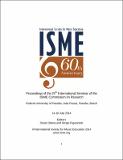Indigenous Music for Classroom Practice: A Process of Building or Burning Bridges?
Abstract/
The purpose of the study was to foster multicultural perspectives in teaching traditional Brazilian Choro music through class instruction to a particular group of American university music students. The theoretical and pedagogical foundations for the development of the study relied upon concepts of comprehensive musicianship, educational objectives and practices, modes of musical knowledge, and aesthetic cultural meaning and relevance of Choro music presented to music students outside Brazil. Research methodology was designed using a qualitative phenomenological approach with descriptive method techniques and procedures. Data were collected through participant-observational and action research practices for a period of five weeks during the Fall semester of 2012. Students were grouped into three different classes with distinct instructional objectives. A jury of 12 members evaluated students live performances on Choro. Results evidenced a hierarchy on three different instructional strategies. Conclusions of the study supported the inclusion of multicultural practices using Choro music experiences overseas with recommendations for further research in other institutions and nations.

